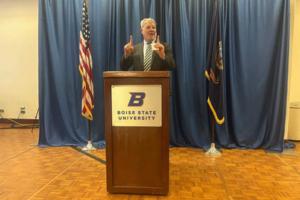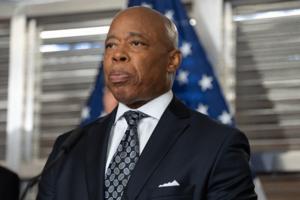Current News
/ArcaMax

Thailand, Cambodia declare ceasefire after weeks of fighting
Thailand and Cambodia agreed to an immediate ceasefire for the second time in six months after the latest round of border clashes killed dozens of soldiers and civilians, while displacing more than half a million others.
The neighboring countries signed a pact on Saturday to end the use of all types of weapons as well as attacks on civilians ...Read more
Post-Christmas storm blankets NYC with more than 4 inches of snow
NEW YORK — Christmas may officially be in the rearview, but there’s still plenty of winter ahead.
New Yorkers on Saturday woke up to the first major snowfall they’ve seen in nearly four years. As of 7 a.m., the storm had ended, with the National Weather Service saying an approximate 4.3 inches of snow had fallen in Central Park.
It ...Read more
Zelenskyy prepares for Trump meeting as Russia bombards Kyiv
Russian forces Ukraine’s capital and key energy facilities with a massive airstrike on the eve of talks between Volodymyr Zelenskyy and Donald Trump aimed at nailing down a plan to end Moscow’s war.
Ukraine’s president stopped in Halifax, Nova Scotia, en route to the U.S., to meet with Canadian Prime Minister Mark Carney. Together, the ...Read more

Haiti's beleaguered police, army get elite French training as gang crisis deepens
Earlier this year, as members of the United Nations Security Council gathered for one of their regular briefings on Haiti, the discussion followed a familiar pattern: the rapid expansion of armed gangs, their increasingly guerrilla-style tactics and the country’s worsening humanitarian crisis.
But in the report presented by Secretary-General ...Read more

End of Trump case caps dramatic year in Georgia courts
ATLANTA — Imprisoned reality television stars Todd and Julie Chrisley were pardoned, President Donald Trump dodged what many people said was the strongest criminal case against him, and jury verdicts reached new heights in a year of significant legal developments in Georgia.
The state also had its first trial in hundreds of pending lawsuits ...Read more

Chicago Transit Authority crime down slightly despite series of high-profile incidents in 2025
CHICAGO — Just past midnight days before Christmas, Chicago police boarded a Pink Line train at Washington and Wells streets and found two men shot.
A knife fight had escalated to a shooting that left one of the men dead, police said.
Such recent cases of violence aboard the system have rattled some riders while also drawing attention from ...Read more

Milei wins Argentina budget approval despite tensions with Macri
Argentina’s Senate approved President Javier Milei’s budget bill for 2026, cementing a legislative victory that overcame renewed tensions between the libertarian leader and his top ally.
In a 46-25 vote, senators passed Milei’s budget in a general vote for the first time since he took office in 2023. The legislative win reflects Milei’s...Read more

Boise State prof with controversial views on women lands at influential think tank
BOISE, Idaho — Boise State professor Scott Yenor, known for his comments calling independent women “meddlesome and quarrelsome” and advocating against feminism, has stirred up controversy on a national scale again.
Yenor has joined The Heritage Foundation, a strong influence in Republican politics — prompting at least one call for ...Read more

A trap was set for a bear living under an Altadena home for a month. It caught the wrong bear
LOS ANGELES — A trap meant to capture a bear that’s been under an Altadena home for a month was sprung but was triggered by the wrong beast.
Biologists at the California Department of Fish and Wildlife have had a bear trap set at Ken Johnson’s house since Dec. 9 in an attempt to capture a 550-pound male black bear that wedged itself in ...Read more

Mayor Adams looks to veto roughly 20 more NYC Council bills on key issues: sources
NEW YORK — Before he leaves office in less than a week, Mayor Eric Adams is likely to veto a bevy of City Council bills that carry significant policy implications for issues ranging from housing development and street vending to immigration and police accountability, sources with knowledge of the matter tell The New York Daily News.
Adams, ...Read more

Malaysia fines ex-PM Najib $2.8 billion for 1MDB scandal, adds jail time
Former Malaysian Prime Minister Najib Razak, already jailed for his role in the 1MDB scandal, faces another 15 years in prison and a fine of 11.4 billion ringgit ($2.8 billion) after being convicted of abuse of power and money laundering in connection with the failed state-run fund.
Judge Collin Lawrence Sequerah announced the sentence after ...Read more

Ashlee Buzzard denies murdering daughter Melodee, won't face death penalty
California mom Ashlee Buzzard pleaded not guilty in the murder of her daughter Melodee during a Friday court hearing in which Santa Barbara prosecutors said they would not seek the death penalty.
The 40-year-old defendant is accused of fatally shooting the 9-year-old girl, whose body was found in a remote area of southern Utah on Dec. 6 ...Read more

Courtroom gasps as Ashlee Buzzard pleads not guilty to murder of 9-year-old Melodee
LOS ANGELES — Ashlee Buzzard, the California mother accused of killing her 9-year-old daughter, Melodee Buzzard, pleaded not guilty Friday morning during a brief but emotional arraignment in Santa Barbara County Superior Court.
Buzzard, 40, appeared in custody for the hearing, where a judge formally arraigned her on charges of first-degree ...Read more

Winter storm buries Wrightwood, drenches Southern California: 'All it is is rock and mud,' resident says
LOS ANGELES — The Gamboa family isn’t quite sure how they’re going to get back into their home in Wrightwood.
When a powerful atmospheric river began drenching Southern California this week, they were forced to leave as the hills around them dissolved into a river of mud and debris, which by Friday was drying and hardening into a 3-foot ...Read more
News briefs
Patel says FBI headquarters to ‘permanently close’ with move
FBI Director Kash Patel said the agency’s historic-but-aging headquarters in Washington would be “shut down permanently” as he shifts personnel into the building once occupied by the now-defunct U.S. Agency for International Development.
“After more than 20 years of ...Read more

Local Massachusetts police department applauds itself for 'significant role' in locating Brown, MIT shooter
BOSTON — A local Massachusetts police department is applauding itself for playing a “significant role” in tracking down the vehicle that the accused Brown University mass shooter allegedly drove to New Hampshire as he tried to evade authorities.
The Waltham Police Department says its detectives “identified critical information” that ...Read more

California withdraws lawsuit challenging Trump's $4 billion high-speed rail funding cut
SACRAMENTO, Calif. — California this week withdrew its lawsuit against the Trump administration over the termination of about $4 billion in federal funding for its high-speed rail project, citing the federal government’s unreliability as the reason for the decision.
The development follows a lawsuit filed in July, when California sued the U...Read more

Patel says FBI headquarters to 'permanently close' with move
FBI Director Kash Patel said the agency’s historic-but-aging headquarters in Washington would be “shut down permanently” as he shifts personnel into the building once occupied by the now-defunct U.S. Agency for International Development.
“After more than 20 years of failed attempts, we finalized a plan to permanently close the FBI’s ...Read more

2 ski patrollers caught in avalanche at California's Mammoth Mountain after big storm
For the second time in less than a year, a pair of ski patrollers at Mammoth Mountain have been caught in an avalanche after a major snowstorm.
At about 7:30 a.m. Friday, before the resort in eastern California opened, the two were performing "avalanche mitigation work" when a sudden slide occurred on Lincoln Mountain, according to Joani Lynch,...Read more

After Trump strike on terrorists, Nigeria says it's open to more
After the United States warned that more strikes may follow its surprise Christmas Day attack on suspected terrorist targets in Nigeria, officials in the West African nation suggested they’d be open to continued intervention.
“I believe this is an ongoing thing and we’re working with the U.S.,” Nigerian Foreign Minister Yusuf Tuggar ...Read more
Popular Stories
- Guns marketed for personal safety fuel public health crisis in Black communities
- Zelenskyy expects to meet Trump Sunday as Russia questions plan
- 2 North Carolina officers shot and in critical condition; suspect killed, police say
- A trap was set for a bear living under an Altadena home for a month. It caught the wrong bear
- Flights canceled, roads closed as storms hit US holiday travel





